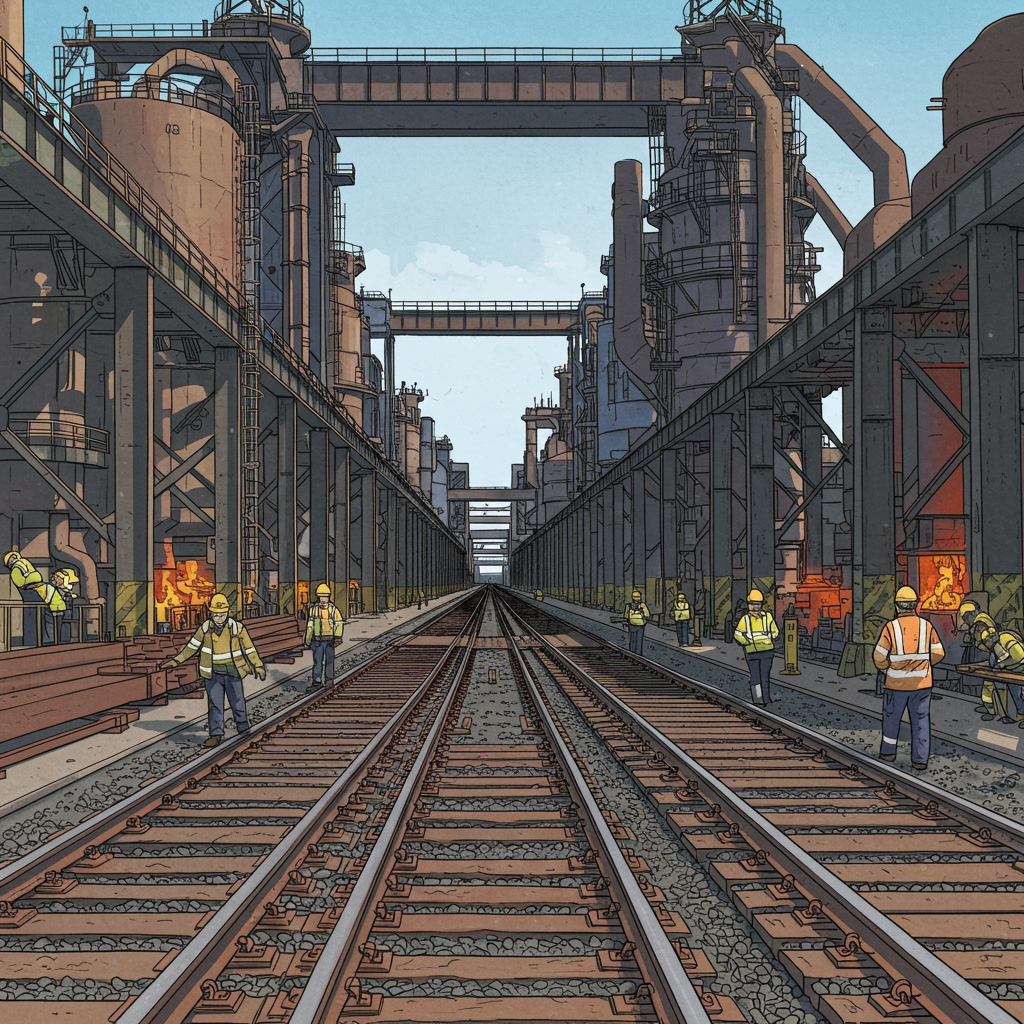British Steel Secures Landmark £500m Network Rail Deal: A Lifeline for Scunthorpe
British Steel has landed a crucial five-year contract valued at £500 million to supply train tracks to Network Rail. This significant agreement is poised to provide a vital boost to the Scunthorpe steelworks, helping to safeguard its short-term future and secure thousands of skilled jobs.
The deal represents a major vote of confidence in UK industry and follows a period of uncertainty for the steel producer. It ensures guaranteed work at the Scunthorpe plant for at least the next five years, building on a long-standing partnership that has seen British Steel supply track for Britain’s railways since 1865, and specifically to Network Rail for over 20 years.
Key Details of the Contract
The agreement, set to commence on July 1st, outlines British Steel’s commitment to forge a minimum of 337,000 tonnes of rail over the contract duration. This is expected to cover approximately 80% of Network Rail’s total track requirements over the next five years, with Network Rail planning to procure nearly 450,000 tonnes overall, sourcing specialist rail products from other European steelmakers alongside British Steel’s supply. Some reports indicate British Steel could supply up to 80,000 tonnes annually under the deal.
Crucially, all the track supplied under this new contract will be manufactured at the Scunthorpe facility, reinforcing its central role in the UK’s rail infrastructure supply chain. The contract also includes an option for a three-year extension, potentially securing this vital work well beyond the initial five-year term.
Safeguarding Scunthorpe’s Future
This contract arrives just two months after the UK government intervened using emergency powers to prevent the immediate closure of the Scunthorpe plant’s blast furnaces. Ministers stepped in amidst concerns that Jingye, the Chinese firm that acquired British Steel in 2020, planned to shut down these critical operations.
The government took control of British Steel in April, stopping short of full nationalisation but actively exploring options for both private investment and potential full public ownership. This intervention was credited with saving the 2,700 jobs directly at the Scunthorpe plant, plus thousands more across the supply chain. The £500 million Network Rail contract is seen as a direct result of this action, providing substantial work to secure these jobs for years to come.
The Strategic Importance of Virgin Steel
A key reason for the government’s urgent intervention was the strategic importance of the Scunthorpe facility as the last plant in the UK capable of producing ‘virgin steel’. This process involves extracting and purifying iron from its original source, a fundamental step required for creating the types of steel used in major construction projects like new railways.
Experts warned that shutting down the blast furnaces – Scunthorpe currently operates two of its four furnaces, named Bess and Anne – would make them incredibly difficult and costly to restart, potentially eliminating the UK’s ability to produce virgin steel domestically. The government has increasingly viewed this capability as a national security issue. The new Network Rail contract ensures the continued operation essential for maintaining this vital UK industrial capacity.
Reactions from Industry and Government
The contract has been widely hailed as positive news. Network Rail’s Director for Railway Business Services, Clive Berrington, affirmed the public company’s commitment to “buying British where it makes economic sense”, stating that British Steel remains “extremely competitive” and will continue to be their main supplier for years ahead.
For British Steel, the agreement is seen as a “huge vote of confidence in UK workers and British industry.” Craig Harvey, the company’s Commercial Director for Rail, highlighted that the contract “demonstrates British Steel’s importance to the UK’s economy and infrastructure” and underscores their vital role in ensuring the safety and reliability of Britain’s railway journeys.
Ministers also welcomed the news. Transport Secretary Heidi Alexander, speaking from Scunthorpe, described the contract as “critically important” and a “landmark contract” that “truly transforms the outlook for British Steel” and its workforce. She explicitly linked the deal to the government’s “urgent action to step in and save these historic blast furnaces from closure,” stating that the contract helps secure their future through meaningful government backing. Business Secretary Jonathan Reynolds echoed this sentiment, calling it “great news” and a “vote of confidence in the UK’s expertise in steelmaking,” which will support thousands of skilled jobs.
Broader Context for UK Steel
This significant deal comes ahead of the government’s national infrastructure strategy release, which is expected later this week. It provides a much-needed boost to the UK steel industry, which has faced considerable uncertainty in recent years, including planned blast furnace closures at other sites like Port Talbot in 2024.
The industry has also navigated challenges posed by US tariffs on steel imports. While the UK has seen some temporary exemptions, a recent US executive order confirming parts of a UK-US tariff deal notably did not include the expected removal of these steel charges, highlighting ongoing complexities in international trade for the sector. Against this backdrop, the £500 million Network Rail contract provides a crucial foundation for British Steel and its vital Scunthorpe operations.



